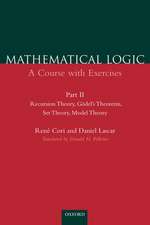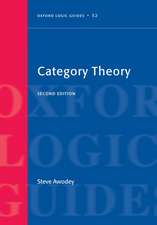Rethinking Logic: Logic in Relation to Mathematics, Evolution, and Method: Logic, Argumentation & Reasoning, cartea 1
Autor Carlo Celluccien Limba Engleză Hardback – 21 oct 2013
Therefore, this volume proposes a view of logic according to which logic is intended, first of all, to provide rules of discovery, that is, non-deductive rules for finding hypotheses to solve problems. This is essential if logic is to play any relevant role in mathematics, science and even philosophy. To comply with this view of logic, this volume formulates several rules of discovery, such as induction, analogy, generalization, specialization, metaphor, metonymy, definition, and diagrams. A logic based on such rules is basically a logic of discovery, and involves a new view of the relation of logic to evolution, language, reason, method and knowledge, particularly mathematical knowledge. It also involves a new view of the relation of philosophy to knowledge. This book puts forward such new views, trying to open again many doors that the founding fathers of mathematical logic had closed historically.
trigger
| Toate formatele și edițiile | Preț | Express |
|---|---|---|
| Paperback (1) | 569.85 lei 38-44 zile | |
| SPRINGER NETHERLANDS – 23 aug 2016 | 569.85 lei 38-44 zile | |
| Hardback (1) | 580.83 lei 38-44 zile | |
| SPRINGER NETHERLANDS – 21 oct 2013 | 580.83 lei 38-44 zile |
Din seria Logic, Argumentation & Reasoning
- 15%
 Preț: 650.19 lei
Preț: 650.19 lei - 20%
 Preț: 524.12 lei
Preț: 524.12 lei - 15%
 Preț: 643.48 lei
Preț: 643.48 lei - 18%
 Preț: 723.06 lei
Preț: 723.06 lei -
 Preț: 394.12 lei
Preț: 394.12 lei - 15%
 Preț: 695.53 lei
Preț: 695.53 lei - 15%
 Preț: 643.34 lei
Preț: 643.34 lei - 20%
 Preț: 513.14 lei
Preț: 513.14 lei -
 Preț: 398.92 lei
Preț: 398.92 lei -
 Preț: 387.96 lei
Preț: 387.96 lei - 15%
 Preț: 643.34 lei
Preț: 643.34 lei - 15%
 Preț: 490.93 lei
Preț: 490.93 lei - 15%
 Preț: 577.54 lei
Preț: 577.54 lei - 18%
 Preț: 726.23 lei
Preț: 726.23 lei - 18%
 Preț: 733.78 lei
Preț: 733.78 lei - 18%
 Preț: 895.56 lei
Preț: 895.56 lei - 15%
 Preț: 696.02 lei
Preț: 696.02 lei - 15%
 Preț: 634.68 lei
Preț: 634.68 lei -
 Preț: 354.54 lei
Preț: 354.54 lei - 18%
 Preț: 723.38 lei
Preț: 723.38 lei - 18%
 Preț: 723.56 lei
Preț: 723.56 lei - 24%
 Preț: 801.68 lei
Preț: 801.68 lei - 15%
 Preț: 634.49 lei
Preț: 634.49 lei - 18%
 Preț: 728.43 lei
Preț: 728.43 lei - 18%
 Preț: 789.98 lei
Preț: 789.98 lei - 18%
 Preț: 787.78 lei
Preț: 787.78 lei - 18%
 Preț: 918.30 lei
Preț: 918.30 lei - 15%
 Preț: 657.25 lei
Preț: 657.25 lei -
 Preț: 397.16 lei
Preț: 397.16 lei -
 Preț: 392.97 lei
Preț: 392.97 lei
Preț: 580.83 lei
Preț vechi: 726.03 lei
-20% Nou
Puncte Express: 871
Preț estimativ în valută:
111.14€ • 116.04$ • 91.98£
111.14€ • 116.04$ • 91.98£
Carte tipărită la comandă
Livrare economică 01-07 aprilie
Preluare comenzi: 021 569.72.76
Specificații
ISBN-13: 9789400760905
ISBN-10: 9400760906
Pagini: 408
Ilustrații: XV, 389 p. 35 illus.
Dimensiuni: 155 x 235 x 27 mm
Greutate: 0.74 kg
Ediția:2013
Editura: SPRINGER NETHERLANDS
Colecția Springer
Seria Logic, Argumentation & Reasoning
Locul publicării:Dordrecht, Netherlands
ISBN-10: 9400760906
Pagini: 408
Ilustrații: XV, 389 p. 35 illus.
Dimensiuni: 155 x 235 x 27 mm
Greutate: 0.74 kg
Ediția:2013
Editura: SPRINGER NETHERLANDS
Colecția Springer
Seria Logic, Argumentation & Reasoning
Locul publicării:Dordrecht, Netherlands
Public țintă
ResearchCuprins
Preface.- Chapter 1. Introduction.- Part I. Ancient Perspectives.- Chapter 2. The Origin of Logic.- Chapter 3. Ancient Logic and Science.- Chapter 4. The Analytic Method.- Chapter 5. The Analytic-Synthetic Method.- Chapter 6. Aristotle's Logic: The Deductivist View.- Chapter 7. Aristotle's Logic: The Heuristic View.- Part II. Modern Perspectives.- Chapter 8. The Method of Modern Science.- Chapter 9. The Quest for a Logic of Discovery.- Chapter 10. Frege's Approach to Logic.- Chapter 11. Gentzen's Approach to Logic.- Chapter 12. The Limitations of Mathematical Logic.- Chapter 13. Logic, Method, and the Psychology of Discovery.- Part III: An Alternative Perspective.- Chapter 14. Reason and Knowledge.- Chapter 15. Reason, Knowledge and Emotion.- Chapter 16. Logic, Evolution, Language and Reason.- Chapter 17. Logic, Method and Knowledge.- Chapter 18. Classifying and Justifying Inference Rules.- Chapter 19. Philosophy and Knowledge.- Part IV: Rules of Discovery.- Chapter 20. Induction and Analogy.- Chapter 21. Other Rules of Discovery.- Chapter 22. Conclusion.- References.- Name Index.- Subject Index.
Recenzii
“Cellucci puts logic back in its place, after it was turned upside down by the drifts of AP (analytical philosophy), which pushed the search for certainty and foundations too far.” (Emiliano Ippoliti, Epistemologia, Vol. 38 (2), July-December, 2015)
“Well documented, closely argued, and informed by truly inspired, and truly incompatible, interpretations of the Western tradition of logic, mathematics, and metaphysics.” (Emily R. Grosholz, Philosophia Mathematica, Vol. 23 (1), February, 2015)
“This textbook traces the history of Logic ranging from epistemology to induction and deduction. … I can recommend it to the philosophical audience for which it is addressed.” (Joseph Grenier, Amazon.com, March, 2014)
“Rethinking Logic is a valuable and remarkable book, especially because it does not resemble to any of the books dealing with logic which normally can be found on the market. … It is … a global and wide philosophical reflection on what logic and knowledge are, which argues for a theoretically purposeful view, with which one may obviously disagree, but with which it is certainly interesting confronting.” (Fabio Sterpetti, Philosophical Inquiries, Vol. 2 (2), 2014)
“Well documented, closely argued, and informed by truly inspired, and truly incompatible, interpretations of the Western tradition of logic, mathematics, and metaphysics.” (Emily R. Grosholz, Philosophia Mathematica, Vol. 23 (1), February, 2015)
“This textbook traces the history of Logic ranging from epistemology to induction and deduction. … I can recommend it to the philosophical audience for which it is addressed.” (Joseph Grenier, Amazon.com, March, 2014)
“Rethinking Logic is a valuable and remarkable book, especially because it does not resemble to any of the books dealing with logic which normally can be found on the market. … It is … a global and wide philosophical reflection on what logic and knowledge are, which argues for a theoretically purposeful view, with which one may obviously disagree, but with which it is certainly interesting confronting.” (Fabio Sterpetti, Philosophical Inquiries, Vol. 2 (2), 2014)
Textul de pe ultima copertă
This volume examines the limitations of mathematical logic and proposes a new approach to logic intended to overcome them. To this end, the book compares mathematical logic with earlier views of logic, both in the ancient and in the modern age, including those of Plato, Aristotle, Bacon, Descartes, Leibniz, and Kant. From the comparison it is apparent that a basic limitation of mathematical logic is that it narrows down the scope of logic confining it to the study of deduction, without providing tools for discovering anything new. As a result, mathematical logic has had little impact on scientific practice.
Therefore, this volume proposes a view of logic according to which logic is intended, first of all, to provide rules of discovery, that is, non-deductive rules for finding hypotheses to solve problems. This is essential if logic is to play any relevant role in mathematics, science and even philosophy. To comply with this view of logic, this volume formulates several rules of discovery, such as induction, analogy, generalization, specialization, metaphor, metonymy, definition, and diagrams. A logic based on such rules is basically a logic of discovery, and involves a new view of the relation of logic to evolution, language, reason, method and knowledge, particularly mathematical knowledge. It also involves a new view of the relation of philosophy to knowledge. This book puts forward such new views, trying to open again many doors that the founding fathers of mathematical logic had closed historically.
Therefore, this volume proposes a view of logic according to which logic is intended, first of all, to provide rules of discovery, that is, non-deductive rules for finding hypotheses to solve problems. This is essential if logic is to play any relevant role in mathematics, science and even philosophy. To comply with this view of logic, this volume formulates several rules of discovery, such as induction, analogy, generalization, specialization, metaphor, metonymy, definition, and diagrams. A logic based on such rules is basically a logic of discovery, and involves a new view of the relation of logic to evolution, language, reason, method and knowledge, particularly mathematical knowledge. It also involves a new view of the relation of philosophy to knowledge. This book puts forward such new views, trying to open again many doors that the founding fathers of mathematical logic had closed historically.
Caracteristici
Expounds a fresh approach to classical logic that aims to restore its utility as a scientific method Reframes Aristotelian methods for use in modern science Adopts a fresh practical perspective on the links between logic and methodology, including the influence of emotions Reconceptualises the relational nexus between logic and knowledge ?
















